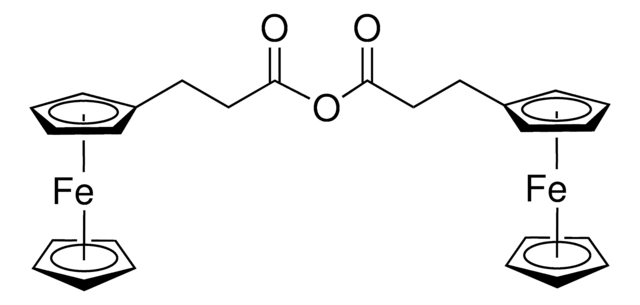91204
Acetic anhydride
for GC derivatization, LiChropur™, ≥99.0%
About This Item
Productos recomendados
grade
for GC derivatization
Quality Level
vapor density
3.5 (vs air)
vapor pressure
10 mmHg ( 36 °C)
4 mmHg ( 20 °C)
assay
≥99.0% (GC)
≥99.0%
form
liquid
autoignition temp.
629 °F
quality
LiChropur™
expl. lim.
10.3 %
reaction suitability
reagent type: derivatization reagent
reaction type: Acylations
technique(s)
gas chromatography (GC): suitable
evapn. residue
≤0.003%
refractive index
n20/D 1.390 (lit.)
bp
138-140 °C (lit.)
mp
−73 °C (lit.)
solubility
H2O: slightly soluble
density
1.08 g/mL (lit.)
SMILES string
CC(=O)OC(C)=O
InChI
1S/C4H6O3/c1-3(5)7-4(2)6/h1-2H3
InChI key
WFDIJRYMOXRFFG-UHFFFAOYSA-N
¿Está buscando productos similares? Visita Guía de comparación de productos
General description
- It increases the stability of compounds by protecting unstable groups.
- It may render volatility on substances like carbohydrates or amino acids, that have several polar groups that they are non-volatile and generally decompose on heating.
- It allows the separations not possible with underivatized compounds.
- Compounds are detectable at very low levels with an ECD.
Acetic anhydride is a reagent utilized to form fragmentation-directing derivatives for GC/MS analysis.
Application
Other Notes
Legal Information
signalword
Danger
hcodes
Hazard Classifications
Acute Tox. 2 Inhalation - Acute Tox. 4 Oral - Eye Dam. 1 - Flam. Liq. 3 - Skin Corr. 1B
Storage Class
3 - Flammable liquids
wgk_germany
WGK 1
flash_point_f
120.2 °F - closed cup
flash_point_c
49 °C - closed cup
ppe
Faceshields, Gloves, Goggles, type ABEK (EN14387) respirator filter
Elija entre una de las versiones más recientes:
¿Ya tiene este producto?
Encuentre la documentación para los productos que ha comprado recientemente en la Biblioteca de documentos.
Los clientes también vieron
Nuestro equipo de científicos tiene experiencia en todas las áreas de investigación: Ciencias de la vida, Ciencia de los materiales, Síntesis química, Cromatografía, Analítica y muchas otras.
Póngase en contacto con el Servicio técnico











